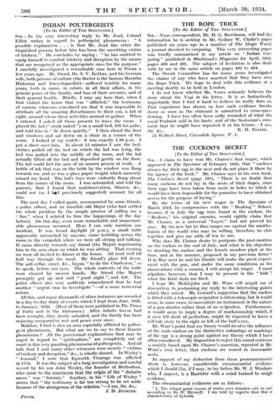INDIAN POLTERGEISTS [To the Editor of THE SPECTATOR.] SIR,—In his
very interesting reply to Mr. Joad, Colonel Elliot writes in regard to poltergeist phenomena : " A possible explanation . . . is that Mr. Soad like 'other dis- tinguished persons before him has been the unwitting victim of trickery." He concludes by saying : " he has omitted to equip himself to combat trickery and deception by the means that are recognized as the appropriate ones for the purpose." I carefully investigated a remarkable case here in Poona a few years ago. Mr. friend, Dr. S. V. Ketkar, and his German wife, both persons of culture (the doctor is the famous Maratha Historian and Encyclopaedist)—suffered terribly for many years, both in name, in estate, in all their affairs, in the general peace of the family, and loss of their servants, and of their general health. Briefly, I may say here that, when I first visited the house that was " afflicted," the testimony of various witnesses convinced me that it was impossible to attribute all the amazing disturbances to their son, a lad of eight, around whom these activities seemed to gather. When I entered, I asked all those present to leave the room. I placed the lad (" stark naked ") on a small bed, felt his pulse, and told him to " lie down quietly." I then closed the door and windows and sat down on a chair in a corner of the room. I looked at my watch ; it was exactly 1.30 p.m. I put a sheet over him. In about 15 minutes I saw the bed- clothes pulled off the bed on which the lad was lying, the bed was pulled into the middle of the room, and the lad actually lifted off the bed and deposited gently on the floor. The lad could feel the arm of an unseen person at work. A bottle of ink that was on the table by the window was flung towards me, and so was a glass paper weight which narrowly missed my head. The lad's toys were violently flung about from the corner of the room. I was astounded, and told the parents, that I found that malobservation, illusion, &e., could not (as I had previously suggested) account for all this.
The next day I called again, accompanied by some friends, a police officer, and an irascible old Major (who had settled the whole problem by the simple process of calling me a b' liar," when I related to him the happenings of the day before). On this day, even more remarkable and unaccount- able phenomena occurred. Here I can only mention one incident. It was broad daylight (2 p.m.), a small table apparently untouched by anyone, came hobbling across the room to the verandah where we were all sitting and talking. It came directly towards my friend (the Major) imprisoning him in the arm chair on which he was sitting. That evening we were all invited to dinner at the house. All went well till half way through the meal. My friend's glass fell down. The salt-cellar, cruet, &c., began " to do the Charleston," so to speak, before our eyes. The whole contents of the table were cleared by unseen hands. My friend (the Major) promptly got tip and said " good night ", and left. The police officer also very suddenly remembered that he had another " urgent case to investigate "—of a more terrestrial nature.
All this, and many thousands of other instances are recorded in a day-to-day diary of events which I kept from June, 1928, to January, 1930. (Most of them were published in The Times of India and in the Statesman.) After infinite havoc had been wrought, they slowly subsided, and the family has been enjoying comparative rest and peace ever since.
Malabar, I find is also an area especially afflicted by polter- gelst phenomena. But what are we to say to these bizarre phenomena ? All the provisional explanations that may be urged in regard to " spiritualism," are completely out of court in this very puzzling phenomena of poltergeists. And all talk that I and many other witnesses were merely " victims of trickery and deception," &c., is wholly absurd. In Wesley's " Journal," I note that Epworth Vicarage was affected in 1716. It was the subject of a long investigation and careful record by his son John Wesley, the founder of Methodism, who came to the conclusion that the origin of the " disturb. ances " was " Satanic." Southey, in his " Life of Wesley " states that " the testimony is far too strong to be set aside because of the strangeness of the relation."—I am, Sir, &c.,








































 Previous page
Previous page